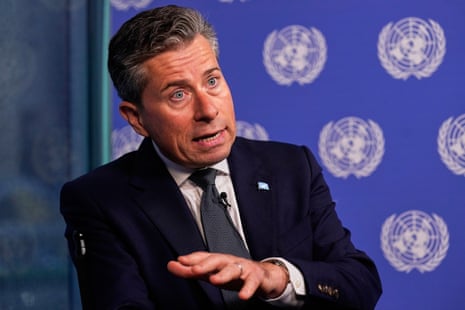
UN warns 14,000 babies could die in Gaza in next 48 hours without aid
The UN’s humanitarian chief, Tom Fletcher, has been speaking to the BBC’s Radio 4’s Today’s programme about the dismal amount of aid Israel is letting into Gaza.
International pressure over a looming famine forced Benjamin Netanyahu to announce on Sunday night that he would ease the devastating 11-week aid blockade to prevent a “starvation crisis” in Gaza – but only to a minimum level.
Fletcher said five trucks of aid went into Gaza yesterday, but described this as a “drop in the ocean” and totally inadequate for the population’s needs.
He said the aid lorries, which contain baby food and nutrition, are technically in Gaza but have not reached civilians as they are just on the other side of the border.

Fletcher said 14,000 babies could die in 48 hours if aid doesn’t reach them in time.
“I want to save as many as these 14,000 babies as we can in the next 48 hours,” he told the BBC.
Asked how the UN arrived at this figure, he responded: “We have strong teams on the ground – and of course many of them have been killed… we he still have lots of people on the ground – they’re at the medical centres, they’re at the schools…trying to assess needs.”

Key events
Iran’s supreme leader Ayatollah Ali Khamenei said on Tuesday that nuclear talks with the United States were unlikely to yield any results, reports Agence France-Presse (AFP).
“We don’t think it will lead to any outcome. We don’t know what will happen,” said Khamenei during a speech, adding that denying Iran’s right to enrich uranium was “a big mistake”.
Iran and the United States have held four rounds of Omani-mediated nuclear talks since 12 April, the highest-level contact between the two countries since Washington abandoned the 2015 nuclear accord. They had confirmed plans to hold another round of discussions during their last meeting on 11 May, which Iran described as “difficult but useful”, while a US official said Washington was “encouraged”.
Iran currently enriches uranium to 60%, far above the 3.67% limit set in the 2015 deal and close though still short of the 90% needed for a nuclear warhead.
Western countries, including the US have long accused Iran of seeking to acquire atomic weapons, while Iran insists its nuclear programme is for peaceful purposes. Iran has repeatedly insisted its right to maintain uranium enrichment was “non-negotiable”, while chief US negotiator Steve Witkoff has called it a “red line”.
On Sunday, Witkoff reiterated that the United States “cannot allow even one percent of an enrichment capability”.
“The American side involved in these indirect negotiations should refrain from speaking nonsense,” said Khamenei.
Earlier, Iran’s foreign minister and lead negotiator Abbas Araghchi said “enrichment in Iran, however, will continue with or without a deal”.
He said in a post on X:
If the US is interested in ensuring that Iran will not have nuclear weapons, a deal is within reach, and we are ready for a serious conversation to achieve a solution that will forever ensure that outcome.
The UK said on Tuesday it had sanctioned a number of individuals and groups in the West Bank who it said had been linked with acts of violence against Palestinians.
More details soon …
Syria’s foreign minister said on Tuesday that the lifting of sanctions on his country shows an “international will” to support his country, after EU countries agreed to end most of its sanctions, reports Agence France-Presse (AFP).
In a press conference in Damascus alongside his Jordanian counterpart, Asaad al-Shaibani said that “lifting sanctions expresses the regional and international will to support Syria”, adding that “the Syrian people today have a very important and historic opportunity to rebuild their country”.
UK’s Starmer says ‘level of suffering’ in Gaza is ‘utterly intolerable’
The PA news agency has more detail on Tuesday’s comments by the UK prime minister, Keir Starmer.
At the dispatch box, he told the House of Commons:
First I’d like to say something about the horrific situation in Gaza, where the level of suffering, innocent children being bombed again, is utterly intolerable.
Starmer later added:
We’re horrified by the escalation from Israel. We repeat our demand for a ceasefire as the only way to free the hostages.
We repeat our opposition to settlements in the West Bank, and we repeat our demand to massively scale-up humanitarian assistance into Gaza.
The recent announcement that Israel will allow a basic quantity of food into Gaza, a basic quantity, is totally and utterly inadequate, so we must coordinate our response because this war has gone on for far too long.
We cannot allow the people of Gaza to starve, and the foreign secretary [David Lammy] will come to the house shortly to set out our response in detail.
UK prime minister Keir Starmer said on Tuesday he, along with the leaders of France and Canada, was horrified by the military escalation in Gaza, repeating calls for a ceasefire.
“I want to put on record today that we’re horrified by the escalation from Israel,” Starmer told parliament, after releasing a joint statement with French president Emmanuel Macron and Canadian prime minister Mark Carney (see 7.35am BST).
According to Reuters, Starmer said that the foreign secretary, David Lammy, would set out the UK’s “response in detail” later on Tuesday.
France seems increasingly likely to recognise a Palestinian state after Paris, along with London and Ottawa, threatened Israel with “concrete actions” for its renewed assault in Gaza.
Asked if the UK was leaning towards official recognition of a Palestinian state, Keir Starmer’s official spokesperson said on Tuesday:
We have been clear that the UK will never give up on the two-state solution, with a Palestinian state and Israel living side-by-side in peace dignity and security.
The prime minister is clear that statehood is an inalienable right of the Palestinian people.
The spokesperson, according to the PA news agency, said the UK was “ready to work with our allies” when asked if the UK would follow France in official recognising a Palestinian state.
French president Emmanuel Macron has indicated he could do this at a coming UN summit (for context: Spain, Ireland and Norway formally recognised a Palestinian state last year, provoking outrage in the Israeli government).
Jens Laerke, spokesperson for the UN office for coordination for humanitarian affairs (OCHA), has responded to comments made by the UN’s humanitarian chief, Tom Fletcher, who told the BBC this morning that 14,000 babies in Gaza could die over the next 48 hours if aid doesn’t reach them (see post at 08.59 for more details).
Speaking to reporters, Laerke said:
For now let me just say that we know for a fact that there are babies who are in urgent life-saving need of these supplements that need to come in because their mothers are unable to feed themselves.
And if they do not get those, they will be in mortal danger. That is as much as I can say right now. If we have more specifics, we’ll go back to you on that.
Israel is not only conducting a war in Gaza, it is also launching frequent attacks in Lebanon.
The Lebanese health ministry said earlier today that an Israeli airstrike injured nine people in a drone attack on the coastal Tyre district in the south of the country.
Three people are now in “critical condition”, the ministry said, adding that two children were among the injured.
Israel has continued to launch strikes on Lebanon despite a ceasefire with Hezbollah, which sates only UN peacekeepers and the Lebanese army should be deployed in southern Lebanon.
Israel, however, has retained its forces in five areas it has declared strategic. Lebanon has called on the international community to pressure Israel to end its attacks and withdraw all its troops.
BREAKING: An Israeli strike targeted a motorcycle near a school in the village of Al-Mansouri, southern Lebanon, injuring at least nine civilians, including children, in yet a new breach of the November 2024 ceasefire agreement. pic.twitter.com/bKOtSOkzHp
— Quds News Network (@QudsNen) May 20, 2025
Here are some of the latest images being sent to us over the newswires from Gaza:
“We have requested and received approval of more trucks to enter today, many more than were approved yesterday,” Jens Laerke, spokesperson for UN office for coordination for humanitarian affairs (OCHA), told reporters in Geneva.
Laerke added that “we expect, of course, with that approval, many of them, hopefully all of them, to cross today to a point where they can be picked up and get further into the Gaza Strip for distribution.”
‘Around 100’ aid trucks to be allowed entry into Gaza – UN
As we’ve reported earlier in the blog, the UN’s humanitarian chief, Tom Fletcher, said only five aid trucks were allowed into Gaza yesterday.
The UN has just confirmed it has been given permission to send “around 100” aid trucks into Gaza today (for context: pre-war an average of 500 trucks were entering per day).
Fletcher earlier acknowledged the risks to staff who may be caught in Israeli airstrikes as they try to deliver the supplies.
Charities have warned of a looming famine across Gaza caused by Israel’s food blockade, which was eased yesterday to a bare minimum level only because of fears key allies (i.e. US senators) were distressed by images of “mass hunger” and could pull support over such scenes.
Israel imposed its blockade in early March, cutting off all supplies including food, medicine, shelter and fuel in what has been widely condemned as the collective punishment of the civilian population in Gaza. Israel claimed the blockade was to pressure Hamas into releasing hostages.
Because of the blockade, most community kitchens have now shut down. Vegetables and meat are inaccessible or unaffordable. The World Health Organization said yesterday that two million people were starving in the Gaza Strip while tonnes of food was being blocked at the border.
Al Jazeera is reporting that at least two people were killed by Israeli drone fire in the Tuffah neighbourhood in Gaza City, while two others were killed by Israeli artillery shelling in the Bureij refugee camp in central Gaza.

Jennifer Rankin
Israel has justified its blockade of Gaza by claiming that Hamas steals food from humanitarian agencies and the UN. The Israeli government denies targeting civilians and says it is fighting a war of survival.
EU policy on Israel has typically been hobbled by the difficulties in finding unanimity among 27 member states with different views, from countries that have recognised Palestine, such as Spain and Ireland, to staunch allies of Israeli president Benjamin Netanyahu, such as Hungary and the Czech Republic.
While the EU-Israel can only be suspended by unanimity, key provisions, including on trade and Israel’s participation in Europe’s Horizon research funding programme can be suspended on the basis of a weighted majority vote.
EU foreign ministers to discuss plans to review bloc’s relationship with Israel

Jennifer Rankin
Jennifer Rankin is Brussels correspondent for the Guardian
EU foreign ministers will discuss plans to review the bloc’s relationship with Israel, amid growing alarm about the dire humanitarian situation in Gaza and the West Bank.
Arriving at a meeting in Brussels, EU foreign policy chief Kaja Kallas said ministers would discuss a Dutch proposal to review the EU-Israel association agreement, a trade accord signed in 2000.
“It’s going to be a very, very hard discussion on Gaza,” she said, noting that member states took different views in their approach to Israel’s government.
France’s foreign minister Jean-Noël Barrot told local media earlier on Tuesday that Paris backed a review of the EU-Israel agreement to see if Israel was respecting its commitments to human rights.
In a letter to Kallas, Dutch foreign minister Casper Veldkamp said Israel’s aid blockade was a violation of its obligations under international humanitarian law and therefore the EU-Israel agreement, which includes provisions to respect human rights. He also expressed concern about Israel’s plans to entrust the delivery of aid to Palestinians to private companies, rather than the UN and humanitarian organisations.
He wrote:
All of this merits a broader reflection on and discussion of our relationship with Israel.
Ireland’s development minister Neale Richmond told reporters that ten countries now supported the decision to review the agreement, up from only a handful a year ago.
Commenting on the growing momentum to review the agreement, he said:
I can only imagine it’s because other member states have eyes and ears and they can see the absolute horrors that are unfolding on a daily basis live on our television screens in Gaza.
Children are dying, children are starving, families are being murdered every day. This is not acceptable and it’s clearly now time for the EU to look at that EU-Israel trade association and the very clear breaches of the human rights under article 2 [of the agreement].
He called on Kallas to provide “a clear message [that] we won’t stand for the status quo”.





